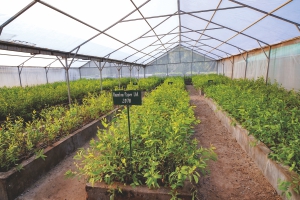Kuantum Papers Limited is among the leading manufacturers of maplitho, creamwove, copier, and specialty paper in India. The company recently released its Annual Report 2022-23, reflecting on its financial performance and a detailed account of various sustainability programs and initiatives it is undertaking. With a deep focus on ESG & CSR projects, the company is fully geared to play an instrumental role in contributing to the economic growth and create a positive impact on people’s lives and contribute to the sustainable development of the communities where they operate.

Kuantum Papers’ recently released Annual Report 2022-23 (FY23 AR) shares a detailed account of Environmental, Social, & Governance (ESG) and Corporate Social Responsibility (CSR) activities undertaken by the company. The company has taken steps at various organizational levels to integrate the ESG and CSR operation within its very framework, for example, it has a team that consists of senior people from the IR and Environment teams. This team actively interacts with nearby villagers/panchayat members/ government authorities on a periodic basis and gets their feedback on the effectiveness of the company’s ESG initiatives. They also ascertain the needs of the community for which they require support from the company. These are then formalized through the CSR program of the company, which is reviewed and approved by the CSR Committee.
“Growth with Sustainability forms the core of our operations at Kuantum and the same is reflected in every aspect of our business and dealings with all the stakeholders. Our growth and expansion strategy is well-integrated with our ESG roadmap, and we are fully committed to being a truly sustainable and socially responsible organization,” stated Mr. Pavan Khaitan, Vice Chairman & Managing Director at Kuantum Papers Limited. Kuantum Papers’ ESG strategy is four-pronged, focusing on:
- Sustainable procurement practices involved in raw materials;
- Sustainability in processes beyond core manufacturing processes;
- Preserving natural ecosystems by undertaking conservation and supportive practices;
- Community involvement for upliftment, better living standards, safety, and security of society.

Sustainable Procurement Practices
At Kuantum Papers, ethical and responsible sourcing of all raw materials used in the production line is ensured. The company ensures sustainability at its core operations through this. The company also actively participates in the Amfori Business Social Compliance Initiative (BSCI), promoting responsible business practices among its major vendors. The commitment is demonstrated across the wood, coal, chemicals, packing materials, imported wood pulp, engineering items, and agro-procurement practices.
- Wood Procurement: Kuantum Papers procures its entire wood requirement exclusively from Tree Outside Forest (TOF) sources. It also uses wood chips and veneer waste, which are the leftover materials of the plywood industry, for wood pulp production. The company is FSC® certified since 2011 and is committed to the compliance of raw material procurement as per the standard. It has also been adopting a long-term Farm Forestry and Fibre strategy. The strategy involves the production of site-specific superior clones of various fast-growing and high-yielding pulp wood species, such as Eucalyptus, Poplar, Casuarina, Melia, and Subabul. The clone saplings are distributed to the local farming communities to foster future wood availability for pulp and paper production. This has enabled the company to produce 9-10 lakh superior clones, covering around 5650 acres of plantation on the farmer’s land. Kuantum Papers has plans to expand its clone saplings number to 1 crore in the next 4-5 years.
- Agro-Raw Materials and Biomass Fuel: The company sources agro-raw materials, such as wheat straw, wild grass, bagasse, and rice husk, as raw materials, as they are both sustainable and beneficial to the local farming community. As agricultural crop residue is utilized, the environment is saved from stubble-burning-induced GHG emissions and pollution. The company has a robust vendor base in different districts of Punjab and neighboring states. The procurement does not hamper other uses of wheat straw, such as animal fodder, as the company’s annual requirement is only 1.1 percent of the total produce of Punjab.
- Coal and Engineering: Kuantum’s coal procurement is handled by the fuel supply agreement and e-auctions, wherein it also secures the long-term availability of chemicals, packing materials, and engineering products. The supply of chemicals is accompanied by a material safety data sheet and test certificates, and mandatory transportation instructions are given to the suppliers of hazardous chemicals. Engineering items are procured from authorized dealers/distributors/manufacturers directly, ensuring adherence to quality norms and reliable after-sales service, while prioritizing energy-efficient motors, lights, and fans are prioritized.
Watch: JMC Paper Tech Launches New Subsidiary JMC Papers
Sustainability Beyond Manufacturing Process
Kuantum Papers builds on its ESG initiatives by ensuring sustainability in operations beyond the core manufacturing processes. This involves ensuring sustainability and environmental consciousness in allied factory processes, such as water consumption and its treatment before discharge, power independence, and efficient & optimizing additions to paper machine lines and other production processes.
- Water Conservation: The company has taken proactive steps to reduce its water consumption in paper production. This involves reusing and recycling water within plant operations, and ensuring that all treated wastewater is being utilized for the irrigation of more than 2,000 acres of land in nearby fields.
- Specialty Products for Sustainability: Kuantum has gone forward by producing sustainable products along with using sustainable raw materials and procurement practices. The company has developed a portfolio of specialty products, such as straw base paper and cup stock, that assist in the replacement of single use plastic products. The company aims to provide environment-friendly alternatives, catering to the changing needs of consumers and regulations.
- Social Farm Forestry Programmes: The company has invested heavily in social farm forestry initiatives to contribute to small and marginal farmers and counter deforestation. These initiatives have helped Kuantum Papers to secure its raw material requirement, reduce procurement costs, and contribute to neighboring communities and ecosystems.
Preserving Natural Ecosystems
Kuantum Papers firmly believes that business and nature can coexist, and has launched and invested in various biodiversity conservation programmes to contribute to the preservation and enhancement of the natural ecosystems that surround its operations.
Kuantum Papers aims to cover at least 2,000 acres of plantations on farmer’s land within a radius of 150 km of mill vicinity during the next financial year. The overall strategy and initiatives of Kuantum Papers could be summarized as follows:
- Biodiversity Targets: The company’s social farm forestry initiatives have led to the maintenance and extension of a vast green belt inside and outside its campus, covering an area of 5650 acres. This belt is home to various plant species of great ethnic and medicinal importance, such as Terminalia arjuna, Azadirachta indica, Ficus bengalensis, Aegle marmelos, Embelica officinalis, Cassia fistula, Syzygium cumini, Psidium guajava, Alastonia scholaris, Ficus religiosa, Poplar spp, Eucalyptus spp, Casuarina spp, Melia, and Grevillea. Since the inception of its green initiatives, Kuantum Papers has planted around 100,000 plants, significantly contributing to biodiversity conservation.
- Minimizing Impact on Biodiversity: The company understands its limitations as a manufacturing concern and has taken conscious steps to equate its impact on surrounding biodiversity. It has set up its own hi-tech nursery with 9-10 lakh clones per annum production capacity for clonal plant production. The company distributes these clonal saplings to local farmers at subsidized rates and provides them with training about land development, pre-planting, and post-planting activities. Additionally, it has implemented initiatives to maintain the ecology and biodiversity of an area, provide a balanced habitat for native fauna, contribute to the productivity of farm enterprises, and preserve the unique character of the landscape.
- Reforestation & Restoring Damaged Ecosystems: Kuantum Papers has invested in the restoration of degraded ecosystems by identifying and reforesting wastelands in and around the mill’s vicinity. It has also initiated tree-planting initiatives in targeted communities in order to promote green cover and minimize soil erosion and groundwater depletion. Being a wood-based industry, the company is actively engaged in reforestation efforts and has planted 7.6+ lakh clonal plants covering 950 acres during FY 2022-23.
Also Read: Indian Paper Industry Explores Opportunities & Challenges in Food Packaging Segment
Community Involvement
Kuantum Papers has collaborated with the farmers’ community surrounding its operations in a highly integrated and intimate manner. These initiatives have helped the company to ensure raw material security, preserve local biodiversity, and establish a healthy industry-nature balance. The company is well aware of the importance & power of the community. Hence, for Kuantum Papers acting responsibly and giving back to society is an inalienable part of its business conduct.

Kuantum Papers’ CSR committee designs and supervises the annual CSR plan with approval from its Board of Directors, ensuring activities are in alignment with the company’s mission to create a sustainable and meaningful impact in society. The plan includes detailed projects, estimated costs, target dates for execution, and a structured monitoring process.
The company has identified three core areas to focus on the community’s upliftment:
- Education: Education has a transformative power that necessitates its assurance for underprivileged children. Kuantum Papers runs a high school, in Saila Khurd, to provide high-quality education and has invested in the construction of Anganwadi schools, in Saila Khurd and Paddi Khutti, to contribute to early childhood care and education. The company has recently assisted addition of new classrooms to the Government High School in Saila Khurd.
- Healthcare: Healthcare is a basic human right and although the government has taken various steps for its penetrated awareness and affordable availability across the country, it does not negate or reduce the responsibility of the empowered faction, like Kuantum Papers. Hence, the company strives to make quality healthcare accessible to the local community. The efforts include regularly organizing free medical check-up camps in surrounding villages, promoting preventive healthcare, sponsoring specialist medical practitioners at local charitable hospitals, and arranging regular provision of clean and safe drinking water. The company has installed RO systems with water coolers in public places, at Saila Khurd, Saila Kalan, and Paddi Khutti, and an overhead water tank with a tube well chamber, at Saila Khurd, to ensure an uninterrupted water supply for the local community. The company has also sponsored an industrial washing machine at Civil Hospital, Garhshankar, to facilitate hygienic cleaning of linen and medical clothing.
- Rural Development: Development is important for the upliftment and betterment of any community. Kuantum Papers invests dedicatedly in the infrastructure development of surrounding villages. The company has helped construct streets and built utility facilities, including toilets. It helped develop a children’s park at village Saila Khurd and installed swings in government schools and other villages to promote recreational activities among the future generation of the nation. It facilitated plantation drives in government schools and Panchayat land, installed street solar lights, and contributed to the construction of the Suvidha Centre building in Garhshankar. As a part of women’s empowerment and self-sustainability initiatives, Kuantum Papers distributed sewing machines to women in surrounding villages. Furthermore, it laid sewerage pipelines and installed sewage treatment plants (STP) to improve sanitation in villages, including Saila Khurd, Bharapur Jattan, Raniala, and Saila Kalan.



